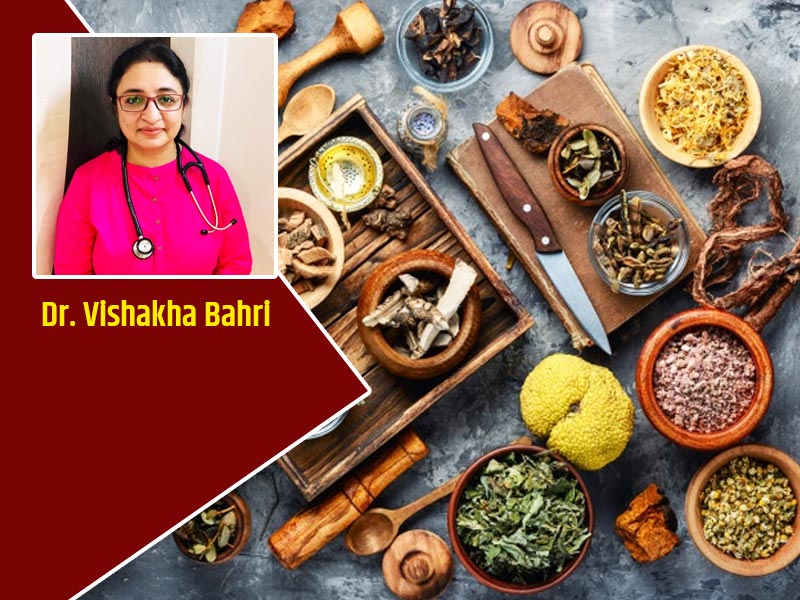
Ayurveda holds many secrets that only those who follow Ayurveda know about. This not only helps in treating various ailments but also allow people to lead a healthy life. This discipline is all about including natural herbs to your lifestyle by either means that help human body heal. It is all-natural with nearly zero side-effects. While it is considered to be a treatment method, it is not fully medicinal. Those who wish to live a healthy and long life turn to Ayurveda for tips and tricks. If you are also someone who is concerned about your health, here is Dr. Vishakha Bahri, Senior Ayurveda Expert sharing some secrets to live a healthier lifestyle.
Table of Content:-
In our modern world, incorporating Ayurvedic principles into your lifestyle is doable, regardless of where you are. All you must do is make a few simple and easy changes to your daily routine, and you'll notice a significant difference in your health.
Practice an Ayurvedic diet
A person’s diet has a significant impact on their overall health and well-being. A poor diet can cause a variety of illnesses and health problems. One of the most basic and practical Ayurvedic diet recommendations is incorporating more vegetables, fruits and nuts like almonds into your daily routine. They are rich in macro and micronutrients that our bodies require.
Although there are specific guidelines for each Dosha in the Ayurvedic diet, the diet as a whole encourages the consumption of whole foods such as fruits, vegetables, grains, and legumes. Because these foods are high in many essential nutrients, they can be highly beneficial to your health.
- Processed foods, which are often devoid of fibre and essential vitamins and minerals, are also avoided in the diet.
- Based on their pharmacological actions outlined in Ayurveda, almonds are used as a ‘Poshaka’ or tonic to help support all tissues
- for ‘Brimhana’ or enhanced body bulk
- for ‘Balya’ or enhanced muscle strength, as ‘Vatanadi uttejaka’ or nervous system stimulant, as ‘Vatanadi balya’ or nerve tissue nourisher, as ‘Vrshya’ or aphrodisiac
- for ‘Varnya’ or enhanced complexion and skin health protection

Focus on how you eat
Digestive problems, according to Ayurveda, are caused by a weak digestive fire (or agni), so igniting it before meals is essential for proper digestion.
- Spices like cumin and turmeric can help with digestion, and half a teaspoon of fresh ginger mixed with a few drops of limejuice and a pinch of salt before a meal* can help salivary glands produce the right amount of digestive enzymes.
- Ayurveda places a strong emphasis on proper digestion because it recognises how our bodies absorb nutrients and function at their best.
- It is recommended that while you're eating, don't watch TV, talk on the phone, or read the newspaper/ magazine etc.
- Based on the teachings of our Shastras it says Ahara (food) is the most important factor for sustenance of life.
According to Ayurveda it is described as foremost pillar among the three pillars of life Food as per Ayurveda is conducive for the maintenance of good health, longevity, strength, intellect, good voice and complexion. A distracting environment harms your body’s ability to digest what you’ve eaten.
Also Read: Following Certain Ayurvedic Diet Rules At Home Can Protect Against COVID-19 Infection
Eat food with six taste components
There are six tastes in Ayurveda that can be found in our diet: Sour, Astringent, Sweet, Salty, Bitter, and Pungent (spicy). Our taste buds are capable of much more than just identifying flavours. They also boost the digestive process and unlock the nutritional value of foods.
- Sour include organic foods that are sour in nature like citrus fruits, Astringent include legumes, Sweet include carbohydrates and natural sugars.
- Bitter include leafy greens and herbs (detoxifying and anti-septic qualities), Pungent include natural spicy foods (aids in digestion).
- Incorporating each of these flavours into each meal helps balance doshas and ensures that you get all of the nutrients your body requires.
For instance, in terms of almonds’ action on doshas (Dosha Karma), they are known as ‘vata-pittahara’ as they help reduce ‘Vata’ and ‘Pitta’ doshas and ‘kaphakara’ as they help increase Kapha dosha and are used accordingly in cases of Dosha imbalance.

Also Read: Suffering From Loss of Smell and Taste? Find Respite With These Remedies
Having a daily routine
Ayurveda advises having a daily routine and sticking to it. Ayurveda emphasises the importance of sleeping and waking times.
- For example, the liver cleanses itself during the night (12 AM), which is when one should follow a good sleeping routine, so Ayurveda recommends sleeping around 10 PM.
- Similarly, you should get up around 6 AM.
- Following your body clock promotes healthy metabolism and the immune system.
Hormone and enzyme production are also regulated by it. Your day feels better, and you have more time to be productive, significantly improving your mood. It also has health benefits because you get some fresh, unpolluted morning air to breathe.
*Kindly check with your physician
Image credits- freepik
Also watch this video
How we keep this article up to date:
We work with experts and keep a close eye on the latest in health and wellness. Whenever there is a new research or helpful information, we update our articles with accurate and useful advice.
Current Version